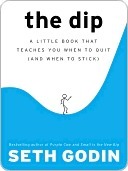More on this book
Community
Kindle Notes & Highlights
by
Seth Godin
Read between
May 15, 2017 - August 27, 2018
Strategic quitting is the secret of successful organizations. Reactive quitting and serial quitting are the bane of those that strive (and fail) to get what they want. And most people do just that. They quit when it’s painful and stick when they can’t be bothered to quit.
If you find yourself facing either of these two curves, you need to quit. Not soon, but right now. The biggest obstacle to success in life, as far as I can tell, is our inability to quit these curves soon enough.
In a competitive world, adversity is your ally. The harder it gets, the better chance you have of insulating yourself from the competition. If that adversity also causes you to quit, though, it’s all for nothing.
The same thing is true about customer service (it would be a lot easier if it weren’t for the customers). In fact, every single function of an organization has a wind problem.
realize that this failed interaction is the best thing that’s happened to you all day long.
And yet the real success goes to those who obsess. The focus that leads you through the Dip to the other side is rewarded by a marketplace in search of the best in the world. A woodpecker can tap twenty times on a thousand trees and get nowhere, but stay busy. Or he can tap twenty-thousand times on one tree and get dinner.
If the journey you started was worth doing, then quitting when you hit the Dip just wastes the time you’ve already invested. Quit in the Dip often enough and you’ll find yourself becoming a serial quitter, starting many things but accomplishing little.
If you want to be a superstar, then you need to find a field with a steep Dip—a barrier between those who try and those who succeed. And you’ve got to get through that Dip to the other side. This isn’t for everyone. If it were, there’d be no superstars. If you choose this path, it’s because you realize that there’s a Dip, and you believe you can get through it.
but you also need to quit all the Cul-de-Sacs that you’re currently idling your way through.
Quitting creates scarcity; scarcity creates value.
The sad news is that when you start over, you get very little credit for how long you stood in line with your last great venture.
the opposite of quitting is rededication. The opposite of quitting is an invigorated new strategy designed to break the problem apart.


